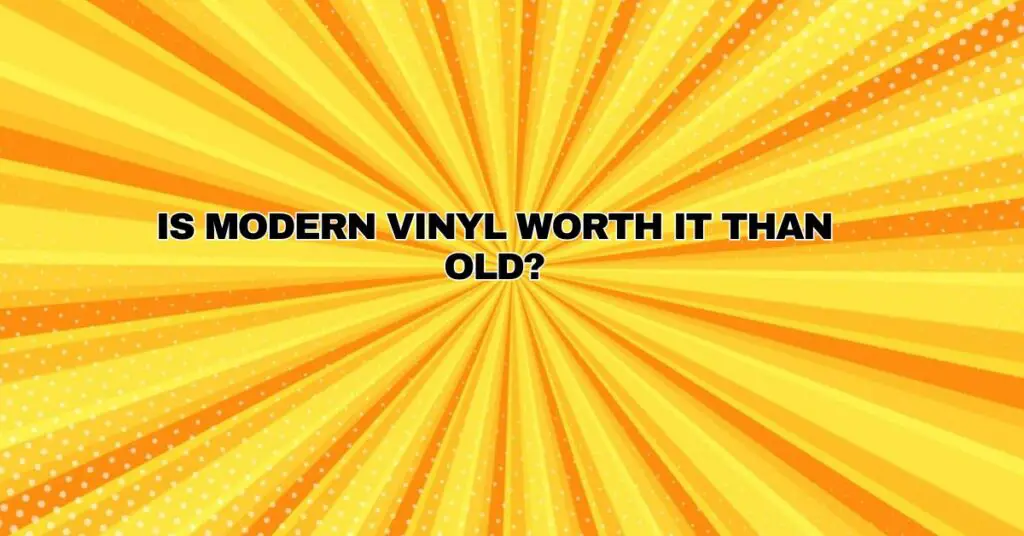In the world of vinyl records, a classic debate persists: Is modern vinyl worth it compared to old? As vinyl enjoys a resurgence in popularity, enthusiasts face the choice of collecting vintage records from the past or investing in new vinyl releases. In this comprehensive article, we will explore the considerations that shape this decision, from sound quality and collectibility to accessibility and personal preference, to help you navigate the vinyl landscape effectively.
Sound Quality: Old vs. Modern Vinyl
Old Vinyl:
- Analog Warmth: Vintage records, especially those from the analog era, are celebrated for their analog warmth and character. Many listeners prefer the unique sound that older records impart, finding it more authentic and nostalgic.
- Surface Noise: Older records may exhibit surface noise, pops, and clicks due to wear and age. This surface noise is part of the analog charm for some but can be distracting for others.
Modern Vinyl:
- Advancements in Manufacturing: Modern vinyl benefits from advanced manufacturing techniques, resulting in records with lower surface noise and improved overall quality control. High-quality pressings and vinyl compounds contribute to cleaner sound.
- Digital Mastering: Many contemporary albums released on vinyl are mastered digitally, ensuring precise sound reproduction and accurate capture of the artist’s intent.
Collectibility: Old vs. Modern Vinyl
Old Vinyl:
- Historical Significance: Vintage records hold historical and cultural significance, particularly those from iconic artists and periods. Collectors often seek out original pressings of classic albums for their historical value.
- Limited Availability: Some vintage records are out of print and no longer in production, making them rare and highly collectible. Limited availability can drive up their value.
Modern Vinyl:
- Contemporary Releases: New vinyl releases encompass a wide range of music genres and artists, including contemporary releases and reissues of classic albums. Collectors may seek out specific pressings or colored vinyl variants for their collections.
- Expanding Market: The resurgence of vinyl has led to an increase in the production of new vinyl records, providing enthusiasts with access to a wide selection of music across various genres.
Accessibility: Old vs. Modern Vinyl
Old Vinyl:
- Hunting for Classics: Collecting vintage records can be an exhilarating treasure hunt, but it may require time, effort, and a dose of luck to find specific classics in good condition.
- Condition Concerns: Vintage records may have experienced wear and tear over the years, and their condition can vary significantly. Finding well-preserved copies can be challenging.
Modern Vinyl:
- Readily Available: New vinyl releases are readily available in record stores, online shops, and at concerts and events. This accessibility makes it easier to find and purchase specific albums.
- Guaranteed Condition: When buying new vinyl, you can expect records to be in brand-new condition, eliminating concerns about wear, scratches, or warping.
Personal Preference: Old vs. Modern Vinyl
Ultimately, the choice between old and modern vinyl is a matter of personal preference. Factors such as sound quality, collectibility, accessibility, and the specific qualities you seek in your vinyl collection should guide your decision. Many collectors and enthusiasts find room in their collections for both old and modern vinyl, appreciating the diverse and evolving vinyl landscape.
Conclusion
The question of whether modern vinyl is worth it compared to old vinyl lacks a definitive answer because it depends on your individual preferences, musical tastes, and collecting goals. Whether you gravitate toward the nostalgia and historical significance of vintage records or embrace the convenience and sound quality of modern vinyl, both formats contribute to the rich and diverse world of vinyl collecting. In the end, the joy of vinyl lies in the music it brings to life, regardless of whether it’s pressed in the past or the present, making each record a cherished piece of the musical journey.

